重庆市北大附中重庆实验学校高三英语高考英语语法课件:省略句
文档属性
| 名称 | 重庆市北大附中重庆实验学校高三英语高考英语语法课件:省略句 |

|
|
| 格式 | zip | ||
| 文件大小 | 524.6KB | ||
| 资源类型 | 教案 | ||
| 版本资源 | |||
| 科目 | 英语 | ||
| 更新时间 | 2012-05-29 10:39:44 | ||
图片预览

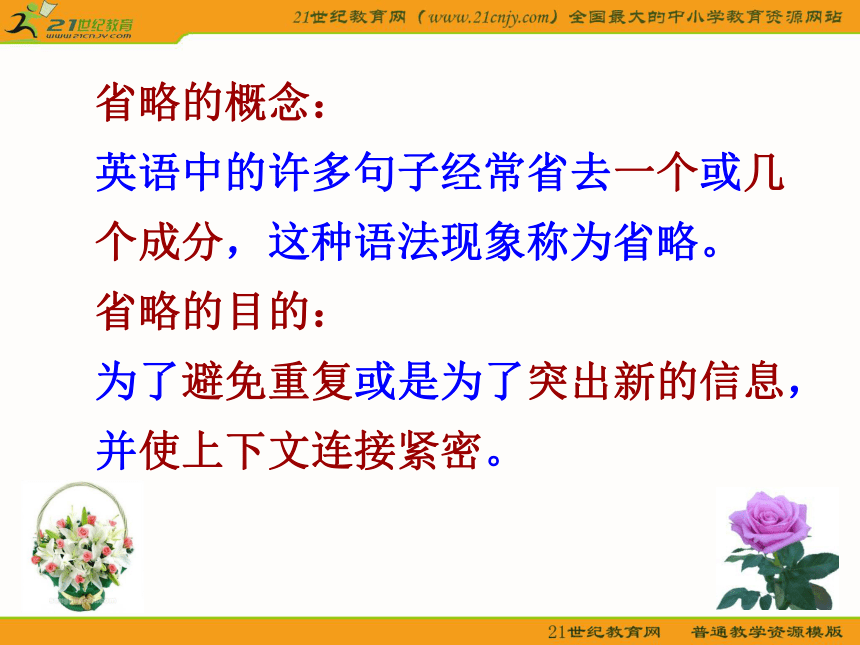
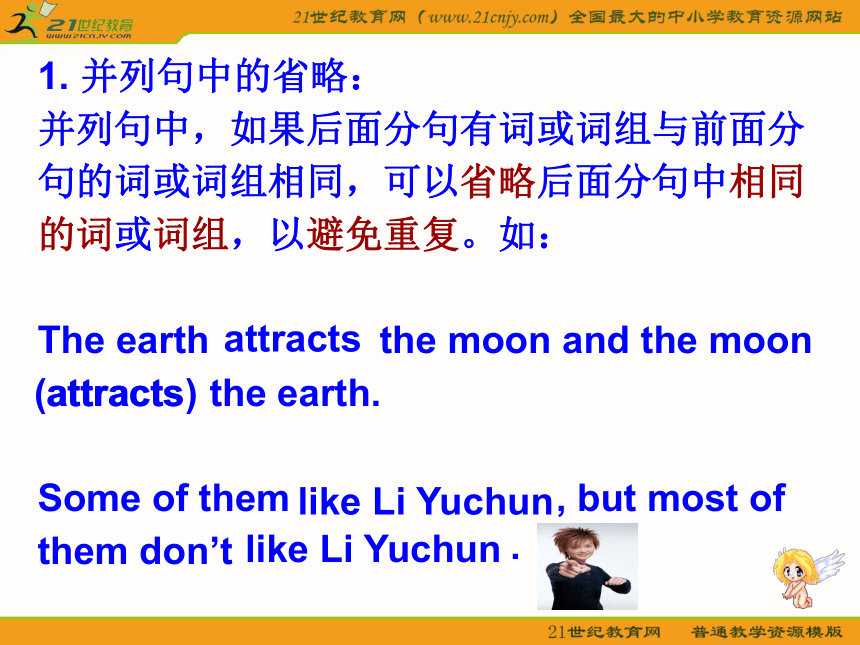
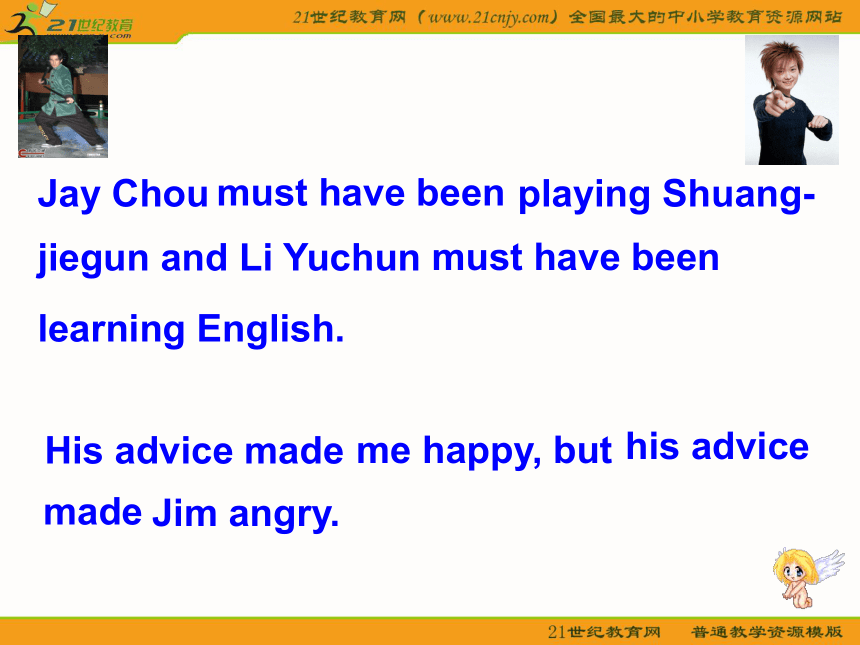
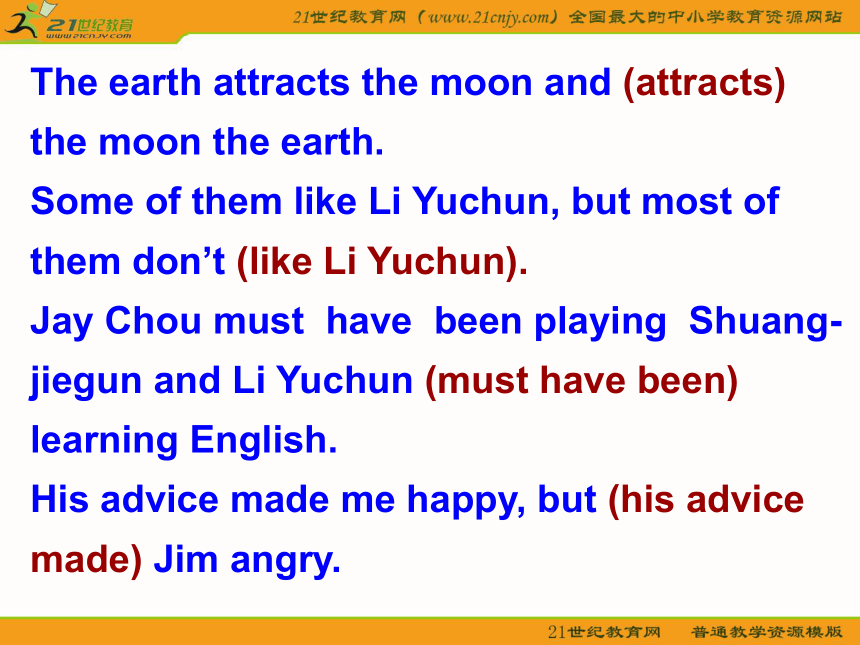
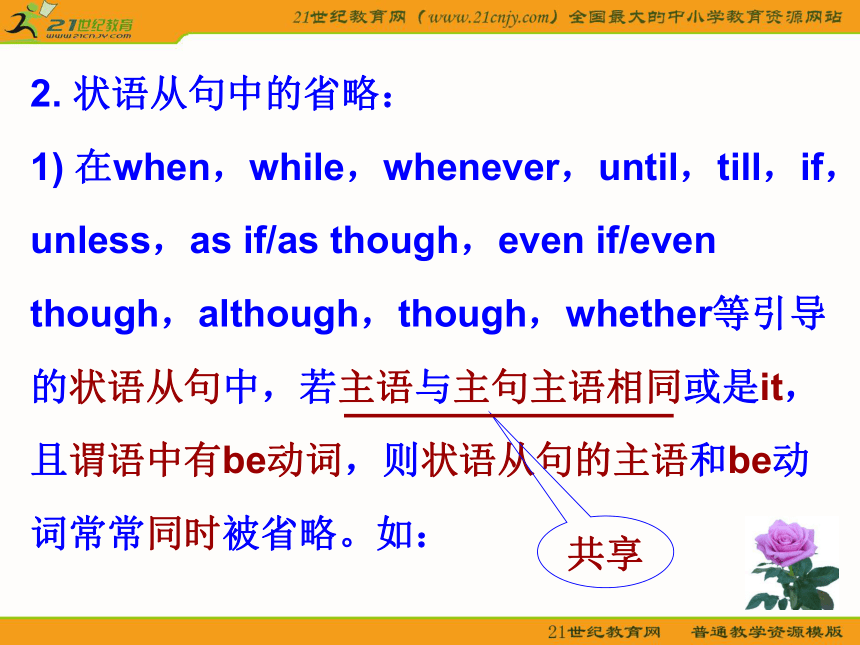
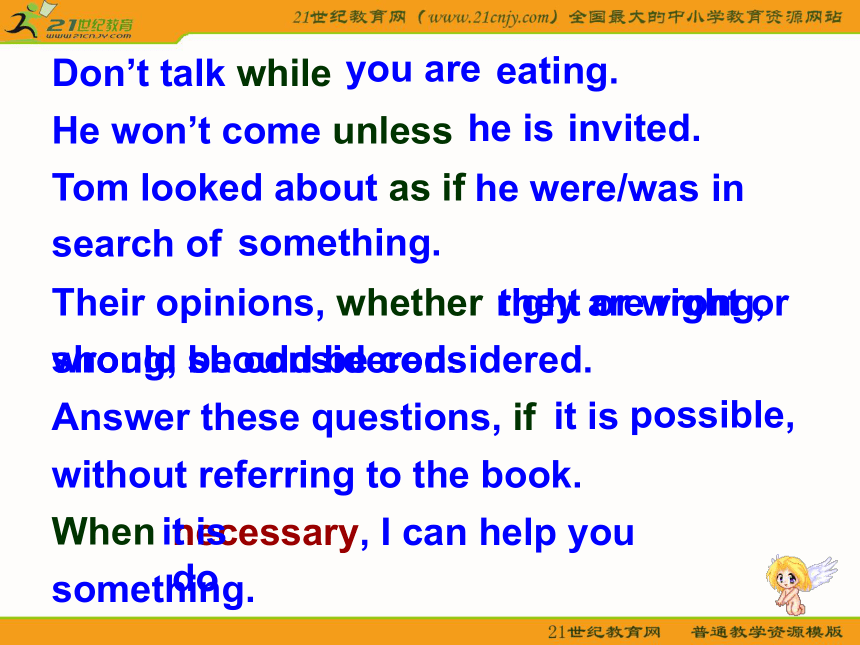
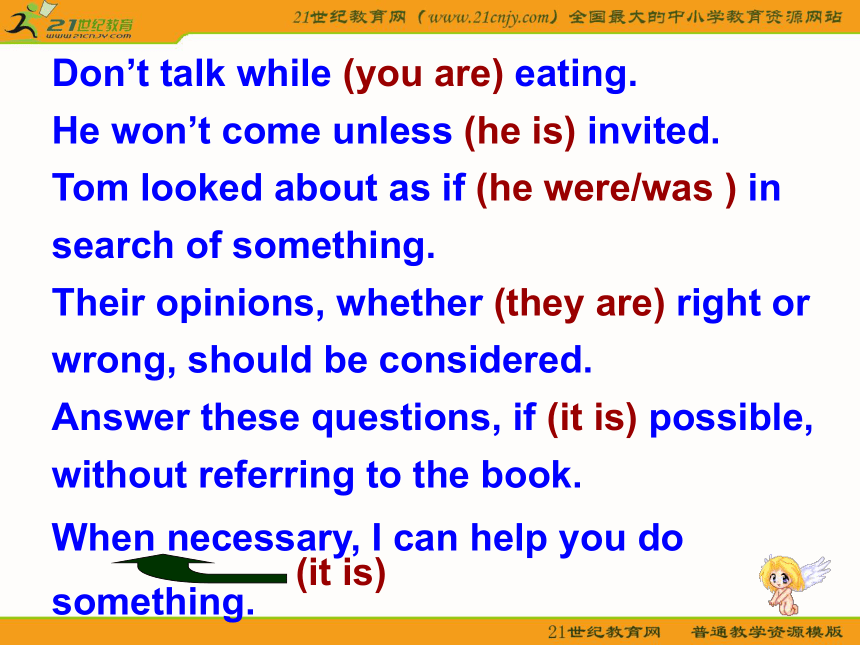
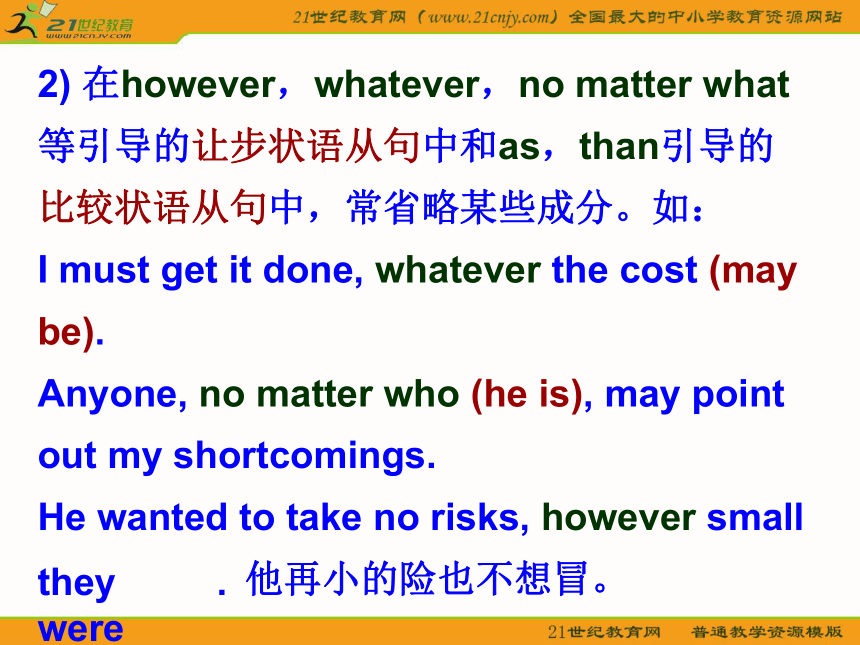
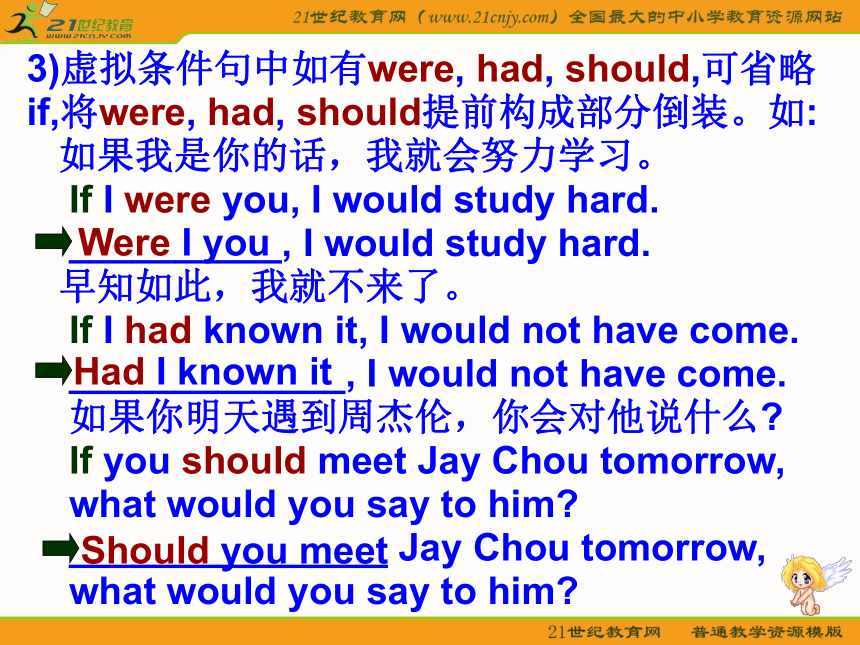
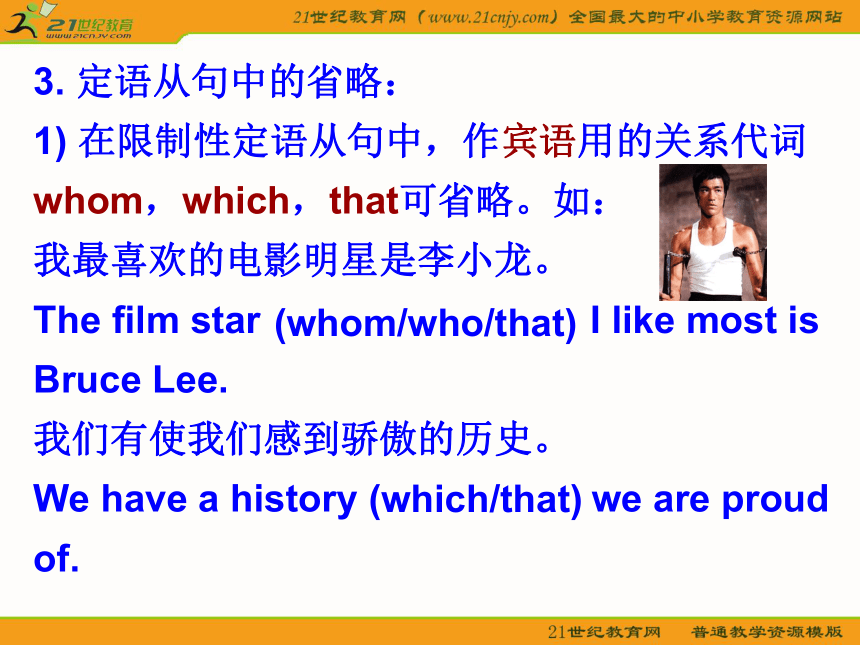
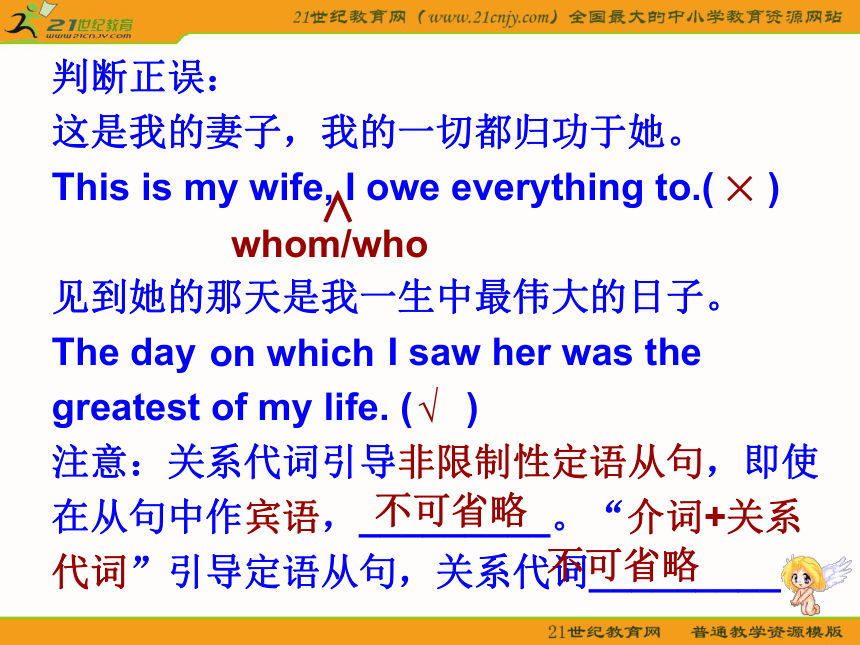
文档简介
(共30张PPT)
省略
省略的概念:
英语中的许多句子经常省去一个或几个成分,这种语法现象称为省略。
省略的目的:
为了避免重复或是为了突出新的信息,并使上下文连接紧密。
1. 并列句中的省略:
并列句中,如果后面分句有词或词组与前面分句的词或词组相同,可以省略后面分句中相同的词或词组,以避免重复。如:
The earth the moon and the moon
Some of them , but most of them don’t
attracts
(attracts)
attracts
like Li Yuchun
the earth.
.
like Li Yuchun
Jay Chou playing Shuang- jiegun and Li Yuchun
me happy, but
must have been
must have been
learning English.
his advice
made
His advice made
Jim angry.
The earth attracts the moon and (attracts) the moon the earth.
Some of them like Li Yuchun, but most of them don’t (like Li Yuchun).
Jay Chou must have been playing Shuang- jiegun and Li Yuchun (must have been) learning English.
His advice made me happy, but (his advice made) Jim angry.
2. 状语从句中的省略:
1) 在when,while,whenever,until,till,if,unless,as if/as though,even if/even though,although,though,whether等引导的状语从句中,若主语与主句主语相同或是it,且谓语中有be动词,则状语从句的主语和be动词常常同时被省略。如:
共享
Don’t talk while
He won’t come unless
Tom looked about as if
Their opinions, whether
Answer these questions, if
without referring to the book.
When
something.
you are
eating.
he is
invited.
he were/was
in
search of
they are right or wrong, should be considered.
right or wrong,
should be considered.
something.
it is
possible,
necessary, I can help you do
it is
Don’t talk while (you are) eating.
He won’t come unless (he is) invited.
Tom looked about as if (he were/was ) in search of something.
Their opinions, whether (they are) right or wrong, should be considered.
Answer these questions, if (it is) possible, without referring to the book.
When necessary, I can help you do something.
(it is)
2) 在however,whatever,no matter what等引导的让步状语从句中和as,than引导的比较状语从句中,常省略某些成分。如:
I must get it done, whatever the cost (may be).
Anyone, no matter who (he is), may point out my shortcomings.
He wanted to take no risks, however small
they were
他再小的险也不想冒。
.
3)虚拟条件句中如有were, had, should,可省略
if,将were, had, should提前构成部分倒装。如:
如果我是你的话,我就会努力学习。
If I were you, I would study hard.
__________, I would study hard.
早知如此,我就不来了。
If I had known it, I would not have come.
_____________, I would not have come.
如果你明天遇到周杰伦,你会对他说什么
If you should meet Jay Chou tomorrow,
what would you say to him
_______________ Jay Chou tomorrow,
what would you say to him
Should you meet
Had I known it
Were I you
3. 定语从句中的省略:
1) 在限制性定语从句中,作宾语用的关系代词whom,which,that可省略。如:
我最喜欢的电影明星是李小龙。
The film star I like most is Bruce Lee.
我们有使我们感到骄傲的历史。
We have a history we are proud of.
(whom/who/that)
(which/that)
判断正误:
这是我的妻子,我的一切都归功于她。
This is my wife, I owe everything to.( )
见到她的那天是我一生中最伟大的日子。
The day I saw her was the greatest of my life. ( )
注意:关系代词引导非限制性定语从句,即使在从句中作宾语,_________。“介词+关系代词”引导定语从句,关系代词_________。
√
whom/who
∧
×
on which
不可省略
不可省略
2) 定语从句中的“主语(关系代词) + be”可以省略。如:
那个国家讲的是什么语言?
What’s the language spoken
in that country
What’s the language spoken in that
country
我从未见过如此聪明勤奋的学生。
Never have I seen a student
so smart and hardworking.
Never have I seen a student so smart and
hardworking.
who/that is
which/that is
4. 名词性从句中的省略:
1)在say, know, think, believe, suppose, consider, find, decide等动词后面所接的一个宾语从句中,连词that可以省略;若后接多个宾语从句,只有第一个连词that可省略,其余的连词that不能省略。如:
I think (that) you like me, do you
我们的语 文老师说这篇课文非常重要,我们应
该把它背住。
Our Chinese teacher said (that) the text
was very important_________________
______________.
and that we should
learn it by heart
2) 在与request, advise, suggest(建议), recommend (建议), demand, require, insist, order, command (命令)等词相关的名词性从句中,须用虚拟语气形式“should + 动词原形”,should可以省略。如:
汤姆建议我们去看电影《功夫熊猫》。
Tom suggested that we (should) go to see the movie Kung Fu Panda. (______从句)
It was suggested that we (should) go to see the movie Kung Fu Panda. (______从句)
Tom made the suggestion that we (should) go to see the movie Kung Fu Panda. (______从句)
Tom’s suggestion was that we (should) go to see the movie Kung Fu Panda. (______从句)
宾 语
主 语
同位语
表 语
5. 动词不定式的省略:
1) 保留不定式符号to的场合:
① 不定式作某些动词的宾语时,常见动词如want , like,love,care,hope,wish,expect,prefer,refuse, mean, agree, afford, forget,remember,try,manage等。如:
对不起,伤害了你的感情。我不是故意的。
I’m sorry I hurt your feelings. I ____________.
didn’t mean to
② 不定式在句中作某些动词的宾语补足语或主语补足语时,常见动词如ask,advise,persuade, tell, wish, allow, permit, force等。如:
最后他们照我的话做了。
At last they did as I told them to. (___补)
如果不是迫不得已,他是不会娶她的。
He would not have married her if he had not been forced to. (___补)
她想来但她父母不让她来。(allow)
She wants to come but her parents won’t
___________.
allow her to
宾
主
2)可省略不定式符号to的场合:
① 主语部分或修饰主语的定语部分有实义动词do的各种形式,作表语的不定式可省略to,也可保留to。如:
What I’d advise you to do is take exercise every day. ( )
The most important thing I should do is (to) give you some advice on how to learn a foreign language. ( )
主语从句中有实义动词do
主语的定语从句中有实义动词do
② 不定式作表示“例外”的介词but,except等的宾语,且前面有实义动词do的各种形式时,须省略不定式符号to。如:
They nothing but watch TV last night.
昨晚他们只看了电视,其他什么都没有干。
I don’t want to anything except________. 除了帮助你们,我什么事情都不想做。
He had no choice but ________________.
他别无选择,只能跟她说了真话。
help you
to tell her the truth
did
do
③ 在see, look at, hear, listen to, watch, notice,observe,feel,have,make,let等词后作宾语补足语时,须省略不定式符号to。如:
昨天我又一次听玛丽动情地讲述她的爱情故事。
Yesterday I listened to Mary speak movingly
about her love story once again.
她的爱情故事总是让我哭泣。
Her love story always makes me cry.
判断正误:
He was seen to cheat in the exam. ( )
有人看见他考试作了弊。
He was made to admit that he had cheated in the
exam. ( )他被迫承认他在考试中作弊。
注:以上动词若可用于被动语态,不定式符号to不可省略。
√
√
④ why (not) do sth 结构中不定式省略to。
Why not_____________
为什么不留下来吃午饭呢?
We can start now, so why_____
我们现在可以开始了,何必等呢?(意思是
“不必要等”)
stay for lunch
wait
6. 介词的省略:
一些和名词、形容词或动词一起搭配的介词常可省略,而保留其后的动名词,常见句型有:spend/waste time (in) doing,lose no time (in) doing, have difficulty/trouble (in) doing, be busy (in) doing,stop/prevent sb (from) doing等。如:
He spends most of his time __________
computer games.
他把大部分时间都花在玩电脑游戏上了。
(in) playing
I had no difficulty/trouble __________ myself understood.
我毫不费力地表达了我的意思。
Nobody can stop/prevent us ___________ married. 没有人能够阻止我们结婚。
(in) making
(from) getting
7.口语中的省略:
有时为了省事,人们常把某些词省掉,特别
是在口语中。如:
有什么问题吗?
明白我的意思吗?
party yesterday.
This way, please. 请这边走。
(Come)
Anything wrong
(Is there)
See what I mean
(Do you)
(It)
Serves him right! 他活该!
Haven’t seen you for ages. 好久不见。
(I)
Pity that I didn’t go to your birthday
(It is a)
2009高考试题实战演练
—Do you like English
—Yes,
—Where did you meet Mr Cheng yesterday
—It was in the Internet bar ______ we often go
A. where B. that C. which
(that I met him).
还原:
I met him in the Internet bar where we often go.
.
(I like English)
very much.
where
1. —I don’t care what people think.
—Well, you ______.
A. could B. would
C. should D. might (四川卷13)
2. Every evening after dinner, if not _____
from work, I will spend some time walking
my dog.
A. being tired B. tiring
C. tired D. to be tired (湖南卷21)
3. All the dishes in this menu, ___ otherwise stated, will serve two to three people.
A. as B. if
C. though D. unless (全国卷II 10)
4. —What’s the matter with Della
—Well, her parents wouldn't allow her to go to the party, but she still ___.
A. hopes to B. hopes so
C. hopes not D. hopes for (江苏卷33)
5. We should consider the students’ request _______ the school library provide more books on popular science.
A. that B. when
C. which D. where (重庆卷31)
Thanks
省略
省略的概念:
英语中的许多句子经常省去一个或几个成分,这种语法现象称为省略。
省略的目的:
为了避免重复或是为了突出新的信息,并使上下文连接紧密。
1. 并列句中的省略:
并列句中,如果后面分句有词或词组与前面分句的词或词组相同,可以省略后面分句中相同的词或词组,以避免重复。如:
The earth the moon and the moon
Some of them , but most of them don’t
attracts
(attracts)
attracts
like Li Yuchun
the earth.
.
like Li Yuchun
Jay Chou playing Shuang- jiegun and Li Yuchun
me happy, but
must have been
must have been
learning English.
his advice
made
His advice made
Jim angry.
The earth attracts the moon and (attracts) the moon the earth.
Some of them like Li Yuchun, but most of them don’t (like Li Yuchun).
Jay Chou must have been playing Shuang- jiegun and Li Yuchun (must have been) learning English.
His advice made me happy, but (his advice made) Jim angry.
2. 状语从句中的省略:
1) 在when,while,whenever,until,till,if,unless,as if/as though,even if/even though,although,though,whether等引导的状语从句中,若主语与主句主语相同或是it,且谓语中有be动词,则状语从句的主语和be动词常常同时被省略。如:
共享
Don’t talk while
He won’t come unless
Tom looked about as if
Their opinions, whether
Answer these questions, if
without referring to the book.
When
something.
you are
eating.
he is
invited.
he were/was
in
search of
they are right or wrong, should be considered.
right or wrong,
should be considered.
something.
it is
possible,
necessary, I can help you do
it is
Don’t talk while (you are) eating.
He won’t come unless (he is) invited.
Tom looked about as if (he were/was ) in search of something.
Their opinions, whether (they are) right or wrong, should be considered.
Answer these questions, if (it is) possible, without referring to the book.
When necessary, I can help you do something.
(it is)
2) 在however,whatever,no matter what等引导的让步状语从句中和as,than引导的比较状语从句中,常省略某些成分。如:
I must get it done, whatever the cost (may be).
Anyone, no matter who (he is), may point out my shortcomings.
He wanted to take no risks, however small
they were
他再小的险也不想冒。
.
3)虚拟条件句中如有were, had, should,可省略
if,将were, had, should提前构成部分倒装。如:
如果我是你的话,我就会努力学习。
If I were you, I would study hard.
__________, I would study hard.
早知如此,我就不来了。
If I had known it, I would not have come.
_____________, I would not have come.
如果你明天遇到周杰伦,你会对他说什么
If you should meet Jay Chou tomorrow,
what would you say to him
_______________ Jay Chou tomorrow,
what would you say to him
Should you meet
Had I known it
Were I you
3. 定语从句中的省略:
1) 在限制性定语从句中,作宾语用的关系代词whom,which,that可省略。如:
我最喜欢的电影明星是李小龙。
The film star I like most is Bruce Lee.
我们有使我们感到骄傲的历史。
We have a history we are proud of.
(whom/who/that)
(which/that)
判断正误:
这是我的妻子,我的一切都归功于她。
This is my wife, I owe everything to.( )
见到她的那天是我一生中最伟大的日子。
The day I saw her was the greatest of my life. ( )
注意:关系代词引导非限制性定语从句,即使在从句中作宾语,_________。“介词+关系代词”引导定语从句,关系代词_________。
√
whom/who
∧
×
on which
不可省略
不可省略
2) 定语从句中的“主语(关系代词) + be”可以省略。如:
那个国家讲的是什么语言?
What’s the language spoken
in that country
What’s the language spoken in that
country
我从未见过如此聪明勤奋的学生。
Never have I seen a student
so smart and hardworking.
Never have I seen a student so smart and
hardworking.
who/that is
which/that is
4. 名词性从句中的省略:
1)在say, know, think, believe, suppose, consider, find, decide等动词后面所接的一个宾语从句中,连词that可以省略;若后接多个宾语从句,只有第一个连词that可省略,其余的连词that不能省略。如:
I think (that) you like me, do you
我们的语 文老师说这篇课文非常重要,我们应
该把它背住。
Our Chinese teacher said (that) the text
was very important_________________
______________.
and that we should
learn it by heart
2) 在与request, advise, suggest(建议), recommend (建议), demand, require, insist, order, command (命令)等词相关的名词性从句中,须用虚拟语气形式“should + 动词原形”,should可以省略。如:
汤姆建议我们去看电影《功夫熊猫》。
Tom suggested that we (should) go to see the movie Kung Fu Panda. (______从句)
It was suggested that we (should) go to see the movie Kung Fu Panda. (______从句)
Tom made the suggestion that we (should) go to see the movie Kung Fu Panda. (______从句)
Tom’s suggestion was that we (should) go to see the movie Kung Fu Panda. (______从句)
宾 语
主 语
同位语
表 语
5. 动词不定式的省略:
1) 保留不定式符号to的场合:
① 不定式作某些动词的宾语时,常见动词如want , like,love,care,hope,wish,expect,prefer,refuse, mean, agree, afford, forget,remember,try,manage等。如:
对不起,伤害了你的感情。我不是故意的。
I’m sorry I hurt your feelings. I ____________.
didn’t mean to
② 不定式在句中作某些动词的宾语补足语或主语补足语时,常见动词如ask,advise,persuade, tell, wish, allow, permit, force等。如:
最后他们照我的话做了。
At last they did as I told them to. (___补)
如果不是迫不得已,他是不会娶她的。
He would not have married her if he had not been forced to. (___补)
她想来但她父母不让她来。(allow)
She wants to come but her parents won’t
___________.
allow her to
宾
主
2)可省略不定式符号to的场合:
① 主语部分或修饰主语的定语部分有实义动词do的各种形式,作表语的不定式可省略to,也可保留to。如:
What I’d advise you to do is take exercise every day. ( )
The most important thing I should do is (to) give you some advice on how to learn a foreign language. ( )
主语从句中有实义动词do
主语的定语从句中有实义动词do
② 不定式作表示“例外”的介词but,except等的宾语,且前面有实义动词do的各种形式时,须省略不定式符号to。如:
They nothing but watch TV last night.
昨晚他们只看了电视,其他什么都没有干。
I don’t want to anything except________. 除了帮助你们,我什么事情都不想做。
He had no choice but ________________.
他别无选择,只能跟她说了真话。
help you
to tell her the truth
did
do
③ 在see, look at, hear, listen to, watch, notice,observe,feel,have,make,let等词后作宾语补足语时,须省略不定式符号to。如:
昨天我又一次听玛丽动情地讲述她的爱情故事。
Yesterday I listened to Mary speak movingly
about her love story once again.
她的爱情故事总是让我哭泣。
Her love story always makes me cry.
判断正误:
He was seen to cheat in the exam. ( )
有人看见他考试作了弊。
He was made to admit that he had cheated in the
exam. ( )他被迫承认他在考试中作弊。
注:以上动词若可用于被动语态,不定式符号to不可省略。
√
√
④ why (not) do sth 结构中不定式省略to。
Why not_____________
为什么不留下来吃午饭呢?
We can start now, so why_____
我们现在可以开始了,何必等呢?(意思是
“不必要等”)
stay for lunch
wait
6. 介词的省略:
一些和名词、形容词或动词一起搭配的介词常可省略,而保留其后的动名词,常见句型有:spend/waste time (in) doing,lose no time (in) doing, have difficulty/trouble (in) doing, be busy (in) doing,stop/prevent sb (from) doing等。如:
He spends most of his time __________
computer games.
他把大部分时间都花在玩电脑游戏上了。
(in) playing
I had no difficulty/trouble __________ myself understood.
我毫不费力地表达了我的意思。
Nobody can stop/prevent us ___________ married. 没有人能够阻止我们结婚。
(in) making
(from) getting
7.口语中的省略:
有时为了省事,人们常把某些词省掉,特别
是在口语中。如:
有什么问题吗?
明白我的意思吗?
party yesterday.
This way, please. 请这边走。
(Come)
Anything wrong
(Is there)
See what I mean
(Do you)
(It)
Serves him right! 他活该!
Haven’t seen you for ages. 好久不见。
(I)
Pity that I didn’t go to your birthday
(It is a)
2009高考试题实战演练
—Do you like English
—Yes,
—Where did you meet Mr Cheng yesterday
—It was in the Internet bar ______ we often go
A. where B. that C. which
(that I met him).
还原:
I met him in the Internet bar where we often go.
.
(I like English)
very much.
where
1. —I don’t care what people think.
—Well, you ______.
A. could B. would
C. should D. might (四川卷13)
2. Every evening after dinner, if not _____
from work, I will spend some time walking
my dog.
A. being tired B. tiring
C. tired D. to be tired (湖南卷21)
3. All the dishes in this menu, ___ otherwise stated, will serve two to three people.
A. as B. if
C. though D. unless (全国卷II 10)
4. —What’s the matter with Della
—Well, her parents wouldn't allow her to go to the party, but she still ___.
A. hopes to B. hopes so
C. hopes not D. hopes for (江苏卷33)
5. We should consider the students’ request _______ the school library provide more books on popular science.
A. that B. when
C. which D. where (重庆卷31)
Thanks
